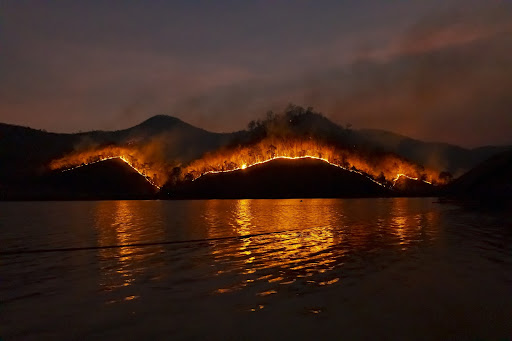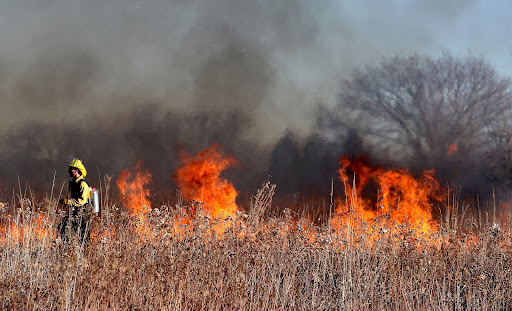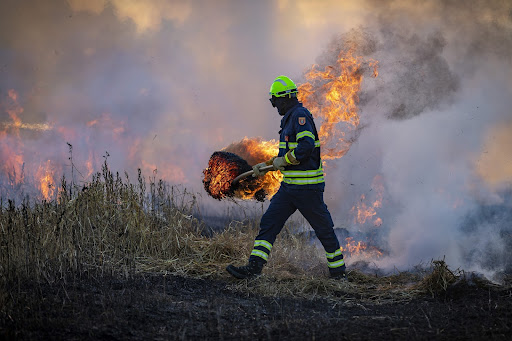
A wildfire, being called the NCAR fire, has broken out over the weekend fire near Boulder, Colorado, and burned nearly 190 acres as of Sunday morning. The cause of the wildfire, which began around 2 p.m. Saturday, was unclear. The wind-fueled wildfire was named the NCAR fire because it started near the National Center for Atmospheric Research. The NCAR fire comes after a blaze, known as the Marshall fire, tore through suburban neighborhoods between Denver and Boulder in December and forced the urgent evacuation of tens of thousands of people. Now this same urgency was felt over the weekend as authorities evacuated over 19,000 people throughout the weekend, officials said. About 1,600 people and nearly 700 homes remained in an evacuation zone as of Sunday morning.
Weekend Wildfire Causes Evacuation Order
The authorities on Saturday ordered evacuations in Table Mesa, on the eastern side of the South Boulder neighborhood, and Eldorado Springs, said Marya Washburn, a spokeswoman for Boulder Fire-Rescue. More than 200 firefighters were in the air and on the ground trying to keep the fire away from neighborhoods. “We’re going to continue to try and corral this fire up into the rocks, into the snow, which is really one of our big holding features right now, and one of the reasons that we’re having really, again, good success,” Michael Smith, the incident commander in Boulder County, said on Sunday. Despite his calling the response to the NCAT fire a success, Smith expressed fear about the upcoming fire season. “I think this is just a sign of the way things are going to go,” he said. Wildfires grow larger every year in the Western United States, and their seasons grow longer. If you live in an area in which wildfires break out frequently, are you prepared if you have to evacuate?

Do You Know How to Evacuate Properly?
If advised to evacuate, do so immediately. Take your disaster supply kit, lock your home, and retreat to a safe place. Watch for changes in the speed and direction of the fire and smoke. Tell someone when you left and where you are going. If you see a wildfire and haven’t received evacuation orders yet, call 9-1-1. Don’t assume that someone else has already called. Describe the location of the fire, speak slowly and clearly, and answer any questions asked by the dispatcher. If you must evacuate, remember most possessions can be replaced, living beings cannot.
If you are not ordered to evacuate and have time to prepare your home, FEMA recommends you take the following actions:
Arrange temporary housing at a friend or relative’s home outside the threatened area in case you need to evacuate
Put on protective clothing when outside such as a hat sturdy shoes, long pants, long-sleeved shirt, gloves, and mask or other type of handkerchief to protect your face
Gather fire tools such as a rake, ax, handsaw or chainsaw, bucket, and shovel
Close outside attic, eaves and basement vents, windows, doors, pet doors, etc. Remove flammable drapes and curtains
Close all shutters, blinds or heavy non-combustible window coverings to reduce radiant heat
Close all doors inside the house to prevent draft
Open the damper on your fireplace, but close the fireplace screen
Shut off any natural gas, propane or fuel oil supplies at the source
Connect garden hoses to outdoor water faucet and fill any pools, hot tubs, garbage cans, tubs or other large containers with water
Place lawn sprinklers on the roof and near above-ground fuel tanks, and leave the sprinklers on, dowsing these structures as long as possible
If you have gas-powered pumps for water, make sure they are fueled and ready

If asked to evacuate FEMA recommends you…
Place a ladder against the house in clear view to aid firefighters
Disconnect any automatic garage door openers so that doors can still be opened by hand if the power goes out, and close all garage doors
Place valuable papers, mementos and anything “you can’t live without” inside the car in the garage, ready for quick departure
Any pets still with you should also be put in the car
Place valuables that will not be damaged by water in a pool or pond
Move flammable furniture into the center of the residence away from the windows and sliding-glass doors
Turn on outside lights and leave a light on in every room to make the house more visible in heavy smoke
FEMA recommends other things such as having landscaping which helps to deter wildfires if possible. Have irreplaceable family heirlooms in one central location if possible. Always know where pet carriers are and keep them as assembled as possible. It is a good idea to keep emergency backpacks for every member of your family, including pets. Being prepared for a wildfire can help ensure you and your family’s safety.
Written by: Erinn Malloy

